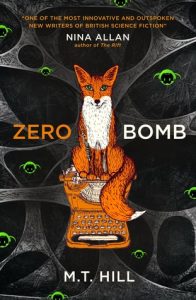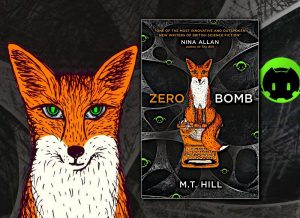ZERO BOMB by M.T. Hill (Book Review)
“He couldn’t stop watching the news. Men and women at lecterns, frothing with ire. Falsehoods and weak pretexts. Lies and disinformation. Endless commentary and speculation, and the insidious ramping-up of fear and confusion. And through it all, Remi’s stomach was his nerve centre: he lived on cortisol and adrenaline, developed a sense of always being on, always watching the news and waiting and dreading. A belief that England’s streets and cities had grown teeth, that anyone and everything was a threat; a belief that the very apocalypse, acid rains and all-consuming, was rolling in. And Martha – it was Martha who would have suffered it all. The news showed him.”
Science fiction’s job is not to predict the future. However, really great science fiction, by warning us about where we could be heading, can force us to confront uncomfortable truths about where we are today. M.T. Hill’s Zero Bomb (2019) does exactly this. Along with Tim Maughan’s Infinite Detail (2019), it is a terrifying vision of our world fifteen minutes into the future, a work that unflinchingly gazes into the heart of our current fascination and dependence on digital technology and where this might lead us if we continue to uncritically surrender our agency to algorithms and automation. But beyond this, Zero Bomb is a bold affirmation of what science fiction can be, should be. It is a wonderfully ambitious novel, strikingly written. Its metafictional conceits highlight the thematic links between the bold experiments of the New Wave SF of the 60s and 70s whilst demonstrating how much the genre has stylistically evolved, and reclaims science fiction as the only genre radical enough to explore the seismic shifts caused by technology in our society today.
 Zero Bomb is the story of Remi, a man traumatised by the constant rolling feed of catastrophic news in post-Brexit Britain, grieving for his daughter and trying to rebuild his life, who is radicalised by a science fiction novel from the 70s. It is also the story of his daughter Martha, who has escaped the grind of 24-hour surveillance and zero-hour contracts in Britain’s smart cities to work on an allotment growing replacement limbs for ex-NHS doctors. And it is the story of Laurel M. Brace, author of 1971 dystopian science fiction classic The Cold Veil, who is now using her novel’s dire warnings against an automated England as a manifesto for her radical terrorist organisation. Over 300 lean pages that stylistically range from third person close view narration to redacted government reports to pitch-perfect extracts from The Cold Veil, Hill weaves together a narrative about how these three people intersect and the devastating implications of Brace’s zero bomb, which destroys England’s digital infrastructure.
Zero Bomb is the story of Remi, a man traumatised by the constant rolling feed of catastrophic news in post-Brexit Britain, grieving for his daughter and trying to rebuild his life, who is radicalised by a science fiction novel from the 70s. It is also the story of his daughter Martha, who has escaped the grind of 24-hour surveillance and zero-hour contracts in Britain’s smart cities to work on an allotment growing replacement limbs for ex-NHS doctors. And it is the story of Laurel M. Brace, author of 1971 dystopian science fiction classic The Cold Veil, who is now using her novel’s dire warnings against an automated England as a manifesto for her radical terrorist organisation. Over 300 lean pages that stylistically range from third person close view narration to redacted government reports to pitch-perfect extracts from The Cold Veil, Hill weaves together a narrative about how these three people intersect and the devastating implications of Brace’s zero bomb, which destroys England’s digital infrastructure.
Zero Bomb is not just a warning of impending catastrophe; it is also offers a path to thinking of better ways to live. Hill does not pretend to have all the answers, but the difference between Martha’s and Remi’s reactions to the pressures of the age they live in is stark and revealing. Remi represents a sink into despondency and despair. Whilst Hill never portrays this as anything other than a sympathetic and understandable response to the horrors of the world, he doesn’t shy away from portraying the selfish and destructive outcomes of Remi’s decision to withdraw from reality. Martha’s childhood has been even more traumatic due to the mistakes Remi has made, but she is in the process of reclaiming her agency in a world where that is increasingly difficult. She has made her own life on the allotment, working in a job that gives back to the local community and circumvents the digital surveillance and control that saturates the world around her. Her makeshift community on the allotment is far from perfect, but it suggests how it may be possible to eke out a meaningful living on the edges of our current technological nightmare, and it’s a necessary step towards regaining her own agency and striking out on her own.
The conflict between these two perspectives comes to a head in the final cathartic confrontation where Remi and Martha finally meet again. This incredibly powerful scene is brutally honest and genuinely haunting, with Martha taking Remi to task for squandering her future and then reacting destructively when he realises what he’s done. It’s an argument that speaks to the current divide between the older and younger generations we’re seeing in both the US and the UK at the moment, and a clear-eyed calling out of the destructive impulses behind the rise of the populist right in both countries.
Much of the novel’s uncanny power is generated through the interplay between Remi and Martha’s story and the echoes present in the novel within the novel, The Cold Veil. Hill clearly knows both his classic and modern science fiction, and is well aware of the differences in style, tone and intent that can exist between them. In the excerpts from The Cold Veil he lovingly pastiches that dry, slightly stilted and vaguely paternalistic voice that is the default for so much vintage science fiction, from John Wyndham through to Michael Moorcock. There is more going on here than just joyously reproducing voices from SF’s past, though. What Hill gets spot-on in The Cold Veil sections is the uncanny prescience of all those glorious late 60s and early 70s New Wave dystopias, the way they frequently get the feel and the tenor of our future right whilst getting many of the actual details wrong. The way the concerns of the sixties and seventies New Wave have in many ways come to fruition, whilst the tech is radically different. Anyone who’s read John Brunner’s classic dystopias will know what I’m getting at, the way we recognise the worlds transfigured by climate change, antibiotic resistance and computer viruses from Stand On Zanzibar (1968), The Sheep Look Up (1972) or The Shockwave Rider (1975) whilst laughing at their depictions of massive computers made of interlinked vacuum tubes and reels of tape taking up giant underground caves.
However, on a deeper level, Remi and Martha’s troubled father/daughter relationship is echoed and contrasted with the father/daughter relationship between Kip and Miranda Mornington in The Cold Veil. The difference between the way the destructive father who is rendered redundant by machines and ends up unwittingly spearheading an anti-technological revolt is handled in both The Cold Veil and Zero Bomb, and the understanding and empathy shown towards the daughter trying to deal with the mess he’s left behind, shows how our perspectives and sympathies have shifted since the 70s. Hill, like Brace, is fully aware that in writing speculative fiction he is speaking to the future, but unlike Brace he is aware of the responsibilities that come with that, and the attendant importance of not sugar-coating the bitter pill of reality but also not sinking into bleakness, despair and despondency.


“Destructive impulses behind the rise of the populist rise of the right in both countries” Funny how it always comes down to politics for the true leftist. Even tho the dangerous rise of tech. And the dehumanization of automation, not to mention the endless desire to control,all come from the left. I think the reviewer read a different book than I did.